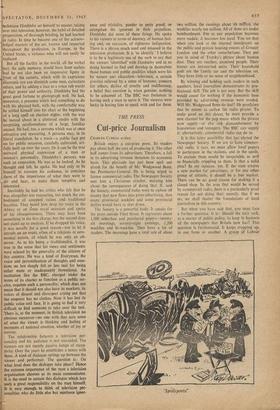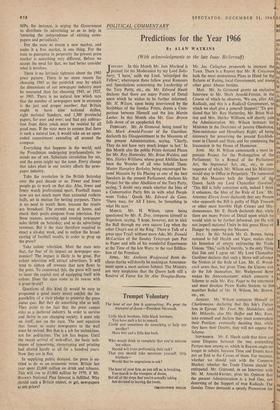THE PRESS
Cut-price Journalism
CHARLES CURRAN writes: Britain enjoys a cut-price press. Its readers pay about half the cost of producing it. The other half comes from its advertisers. Therefore, a fall in its advertising revenue threatens its economic basis. This platitude has just been spelt out afresh for the benefit of Mr. Wedgwood Benn, the Postmaster-General. He is being urged to license commercial, radio. The Newspaper Society sent him a Christmas cracker, warning him about the consequences of doing that. If, said the Society, commercial radio were to siphon off Money that now flows into press advertising, then many provincial weeklies and some provincial dailies would have to shut down.
The Society is a powerful body. It speaks for the press outside Fleet Street. It represents about 1,300 suburban and provincial papers—twenty- six mornings, seventy-eight evenings, 1,200 weeklies and bi-weeklies. They have a lot of readers. The mornings have a total sale of about two million, the evenings about six million, the weeklies nearly ten million. All of them are under bombardment. For as our population becomes more mobile, it becomes less local. You see that when you look at the internal immigrants on the public and private housing estates of Greater London and the other conurbations. They put you in mind of Trotsky's phrase about human dust. They are rootless, atomised people. Their homes are introverted units. Their household gods are the family car and the television set. They have little or no sense of neighbourhood.
By winning and holding such readers in such numbers, local journalism demonstrates its pro- fessional skill. The job is not easy. But the skill would count for nothing if the economic base provided by advertising revenue were eroded. Will Mr. Wedgwood Benn do that? He proclaims that he means to outlaw the radio pirates. To make good on this threat, he must provide a new channel for the pop music which the pirates now supply—or else risk dismemberment by housewives and teenagers. The BBC can supply it; alternatively, commercial radio can do so.
It is this latter possibility that has alerted the Newspaper Society. If we are to have commer- cial radio, it says, we must allow local papers to participate in the stations, and in the spoils. To exclude them would be inequitable, as well as financially crippling to them. Is that a valid plea? In my opinion, yes. If the state creates a new market for advertisers, or for any other group of citizens, it should be a free market. There can be no good reason for making it a closed shop. In the area that would be served by commercial radio, there is a particularly good reason for not doing that; namely, that if we do, we shall shatter the foundations of local journalism in this country.
But when you have said that, you must face a further question. It is: Should the state seek, as a matter of public policy, to keep in business all the newspapers that Britain now has? This question is fundamental. It keeps cropping up, in one form or another. A group of Labour
'Spoilsports!'
MPs, for instance, is urging the Government to distribute its advertising so as to help in 'ensuring the independence of existing news- papers and periodicals.'
For the state to create a new market, and make it a free market, is one thing. For the state to guarantee in perpetuity the present press market is something very different. Before we accept the need for that, we had better consider what it involves.
There is no intrinsic rightness about the 1965 press pattern. There is no more reason for choosing 1965 as the yardstick year by which the dimensions of our newspaper industry must be measured than for choosing 1945, or 1925, or 1905. There is no natural law which says that the number of newspapers now in existence is the just and proper number; that Britain ought to have nine ' national dailies, eight national Sundays, and 1,300 provincial papers, for ever and ever; and that any subtrac- tion from these totals must be resisted by all good men. If the state were to assume that there is such a natural law, it would take on an open- ended commitment extending all around the compass.
Everything that happens in the world, said the Frenchman undergoing psychoanalysis, re- minds me of sex. Substitute circulation for sex, and the press might say the same. Every change that takes place in our society affects the news- paper industry.
Take the revolution in the British Saturday over the past decade or so. Fewer and fewer people go to work on that day. Also, fewer and fewer watch professional sport. Football teams now are not much more than animated roulette balls, set in motion for betting purposes. There is no need to watch them, because the results are broadcast. The crowds stay at home, and check their pools coupons from television. For these reasons, morning and evening newspaper sales shrink on Saturday; and so do advertising revenues. But is the state therefore required to enact a six-day week, and to outlaw the broad- casting of football results, in order to prop up the press?
Take colour television. Must the state veto that, for fear of its impact on newspaper eco- nomics? The impact is likely to be great. For colour television will attract advertisers. It will tend to siphon off revenue that now flows to the press. To counteract this, the press will need to incur the capital cost of equipping itself with colour. Does the state come to its rescue with a grant-in-aid?
Questions of this kind (it would be easy to propound a good many more) exhibit the im- possibility of a state pledge to preserve the press
status quo. But they do something else as well. They point to the fact that the press cannot
exist as a sheltered industry. In order to survive and thrive in our changing society, it must rely on itself, not on the state. The cost equation that forces so many newspapers to the wall must be revised. But that is a job for technicians, not for politicians. The job has begun. Until the recent arrival of web-offset, the basic tech- niques of typesetting, stereotyping and printing had altered hardly at all for a hundred years. Now they are in flux.
In supplying public demand, the press is en- titled to do so on economic terms. Britain last year spent £2,600 million on drink and tobacco. This will rise to £3,000 million by 1970, if Mr. Brown's National Plan forecast is fulfilled. Why should such a Britain expect, or get, newspapers at cut prices?

















 Previous page
Previous page